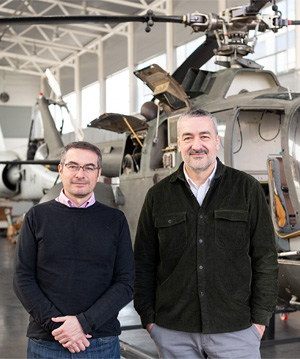LAMISTAD Project
Researchers from the Universitat Politècnica de València participate in the international team promoting the installation of a synchrotron in the Greater Caribbean.
[ 11/03/2024 ]
Researchers from the Universitat Politècnica de València (UPV), the Universidad Autónoma de México (UNAM) and the Centro Internacional de Física de Bogotá are working on a project to build a new synchrotron in the Greater Caribbean. The latest issue of the journal Nature features an article on the history of this initiative and the steps being taken to make it a reality.
"The project we are working on is called LAMISTAD (Latin American International Synchrotron for Technology, Analysis, and Development) and aims to make the Wider Caribbean Light Source a reality. In the world of science, large facilities not only pave the way for revolutionary discoveries but also contribute to the development of high capacities and equality between regions: where they are built, there are opportunities for employment, improvement of skills and progress in key infrastructures," points out Pedro Fernández de Córdoba, researcher at the Research Institute for Pure and Applied Mathematics and professor at the School of Industrial Engineering-UPV.
Among these vast facilities, synchrotrons stand out for their great scientific and industrial potential. They are essential in fields such as condensed matter physics, the study of materials, the development of new drugs and vaccines, and the characterisation of soils and biological processes.
However, access to these infrastructures is uneven worldwide. Low- and middle-income countries, particularly in the Greater Caribbean and Africa, need help to use these cutting-edge scientific tools. "We are developing the LAMISTAD project precisely to try to reduce this gap and fully exploit the scientific potential of these regions," adds Juan Angel Sans, a researcher at the Research Institute of Design for Manufacturing and Automated Production and full professor at the School of Aerospace Engineering and Industrial Design -UPV (ETSIADI).
The work of Pedro Fernández de Córdoba and Juan Ángel Sans is focused on the technical part of the project, as well as on the promotion of communication actions; among other things, they are part of the team that is preparing a proposal that will soon be submitted to UNESCO to obtain support for this project.
"The road to the construction of the Greater Caribbean Light Source will not be easy, but its realisation could represent a significant step towards equity in access to science, technology and regional development. Making this vision a reality will require strong support from the scientific community, policymakers, and international organisations focused on developing science and technology," adds Pedro Fernández de Córdoba.
New Latin American synchrotron linked to Africa
There is already a synchrotron in Latin America, at Campinas in Brazil. The infrastructure promoted by LAMISTAD would complement and make it possible to address problems closer to the area for studies in agriculture, archaeology or cultural heritage.
In addition, the LAMISTAD project is creating synergies with the African initiative to launch the African Light Source, which aims to create a pan-African synchrotron facility. "The foundations are being laid for a link between Africa and Latin America that will boost these facilities in both parts of the world," adds Juan Angel Sans.
Along with the UPV researchers and professors, the article is signed by Víctor M. Castaño from UNAM and Galileo Violini, director emeritus of the International Physics Centre of Bogota.
References
Victor M. Castaño, Pedro Fernández de Córdoba, Juan A. Sans & Galileo Violini, Big Science in Latin America: Accelerated Particles and Progress. An advanced light source for research would boost growth in the Greater Caribbean region - scientifically, economically and socially. Nature 627, 32-34 (2024). DOI: https://doi.org/10.1038/d41586-024-00598-4
Outstanding news
 Study a degree at the best technological university in Spain
Study a degree at the best technological university in Spain
The Universitat Politècnica de València is ranked number 1 among Spanish technology universities, according to the Shanghai ranking
 Highly Cited Researchers 2025
Highly Cited Researchers 2025
Avelí Corma, Juan Bisquert and Luis Guanter, the international scientific elite with a Universitat Politècnica de València hallmark
 Historic Milestone in Spanish Higher Education
Historic Milestone in Spanish Higher Education
The UPV inaugurates the Beihang Valencia Polytechnic Institute, the first Spanish university center in China
 Study in English
Study in English
The UPV offers eight degrees, 16 master's and 650 courses in English for the 2025-26 academic year
 A Latin Grammy... with the UPV hallmark
A Latin Grammy... with the UPV hallmark
'Music teaches us to listen and live together,' says Rafael Serrallet, Doctor of Music at the UPV, awarded in Las Vegas as the author of the Best Instrumental Album of 2025
 THE Impact Ranking
THE Impact Ranking
The UPV, the Spanish university with the greatest social and economic impact in the world

